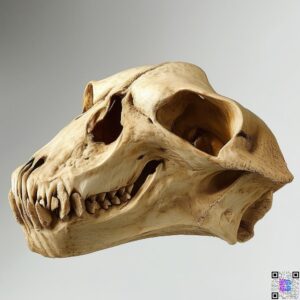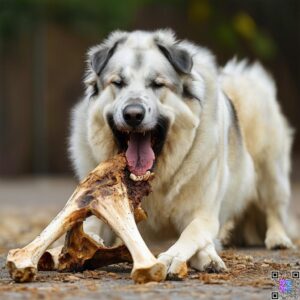Introduction
The Anatolian Shepherd is a breed of dog known for its impressive size, strength, and protective instincts. One of the most notable features of this breed is its powerful jaws, which are essential for guarding livestock and deterring predators. In this comprehensive guide, we will explore the anatomy of the Anatolian Shepherd’s jaw, factors contributing to its strength, and the responsible ownership considerations that come with owning a breed with such formidable capabilities.
Anatolian Shepherd Jaw Strength

The Anatolian Shepherd is a large breed, with males typically standing between 28-31 inches tall at the shoulder and weighing between 110-150 pounds. This size and build contribute to the breed’s impressive jaw strength, which is essential for its guarding and protective roles.
Anatomy of the Anatolian Shepherd’s Jaw
The Anatolian Shepherd’s jaw is characterized by a broad, square muzzle and a strong, muscular neck. The breed’s teeth are large and well-developed, with powerful molars and canines that are capable of inflicting serious damage. The jaw muscles, particularly the masseter and temporalis muscles, are well-developed and provide the breed with a powerful bite.
Factors Contributing to Jaw Strength
Several factors contribute to the Anatolian Shepherd’s impressive jaw strength, including:
- Genetics and selective breeding: The breed’s jaw strength is the result of selective breeding over many generations, with breeders prioritizing traits that enhance the breed’s guarding and protective abilities.
- Nutrition and diet: A balanced diet rich in protein, calcium, and other essential nutrients is crucial for the development of strong bones and muscles, including the jaw muscles.
- Exercise and physical activity: Regular exercise and physical activity help to maintain the breed’s muscle tone and overall fitness, which can contribute to jaw strength.
- Age and maturity level: Jaw strength typically increases as the Anatolian Shepherd matures, with the breed reaching full physical maturity between 18-24 months of age.
Measuring Jaw Strength
Bite force testing methods have been used to measure the jaw strength of various dog breeds, including the Anatolian Shepherd. These tests typically involve placing a device between the dog’s jaws and measuring the amount of force exerted. While the Anatolian Shepherd’s bite force has not been extensively studied, the breed is generally considered to have one of the strongest bites among domestic dogs.
Responsible Ownership and Jaw Strength
Owning an Anatolian Shepherd comes with significant responsibilities, particularly when it comes to managing the breed’s impressive jaw strength. Proper training and socialization are essential for preventing and managing aggressive behavior, and owners must be aware of local laws and regulations regarding the ownership of large, powerful breeds.
Training and Socialization
Proper training and socialization are crucial for Anatolian Shepherds, as they can be prone to guarding and protective behaviors. Owners should begin training and socialization at a young age, focusing on obedience commands, bite inhibition, and exposure to a variety of people, animals, and environments.
Legal Considerations
In some areas, there may be breed-specific legislation (BSL) that regulates the ownership of large, powerful breeds like the Anatolian Shepherd. Owners should be aware of local laws and regulations and ensure that they are in compliance.
Anatolian Shepherd Jaw Strength in Action
The Anatolian Shepherd’s impressive jaw strength is put to use in a variety of ways, particularly in its role as a livestock guardian dog. The breed’s powerful jaws and protective instincts make it an effective deterrent against predators and intruders, and its guarding abilities have been valued by shepherds and farmers for centuries.
Guarding and Protecting Livestock
The Anatolian Shepherd’s primary role is to guard and protect livestock, such as sheep and goats, from predators like wolves, bears, and coyotes. The breed’s powerful jaws and intimidating presence are often enough to deter potential threats, and its willingness to engage in physical confrontation when necessary makes it a formidable guardian.
Hunting and Scavenging Behaviors
While the Anatolian Shepherd is primarily a livestock guardian, its impressive jaw strength can also be useful for hunting and scavenging behaviors. The breed’s powerful jaws and teeth allow it to tackle and subdue large prey, and its scavenging abilities make it adept at finding and consuming a variety of food sources.
Myths and Misconceptions About Jaw Strength
Despite the Anatolian Shepherd’s impressive jaw strength, there are several myths and misconceptions surrounding the breed’s capabilities and temperament. One common misconception is that all Anatolian Shepherds are inherently aggressive or dangerous, which is not the case. The breed’s temperament is largely influenced by genetics, training, and socialization, and responsible owners can help to prevent and manage aggressive behaviors.
Individual Temperament and Training
While the Anatolian Shepherd’s jaw strength is impressive, it is important to remember that each individual dog is unique. Factors like genetics, training, and socialization can all influence a dog’s temperament and behavior, and responsible owners should work to ensure that their Anatolian Shepherd is well-adjusted and well-behaved.
Modern Applications in Conservation
Interestingly, Anatolian Shepherds have also found roles beyond traditional farming practices. In recent years, they have been employed in conservation efforts worldwide. For instance, they are now used in Namibia to protect endangered cheetahs by guarding livestock without harming these vulnerable animals. This innovative approach has significantly reduced conflicts between farmers and wildlife.
Tips for New Owners
- Research: Understand the breed’s needs before bringing one home.
- Space: Ensure you have enough space; they thrive best with room to roam.
- Commitment: Be prepared for long-term commitment; these dogs require time and attention.
Integrating into Your Home
Introducing an adult dog into your household can be smooth if done correctly. Gradually introduce them to family members and existing pets while providing a safe space where they can retreat if feeling overwhelmed. This article provides comprehensive insights into the world of the Anatolian Shepherd, particularly focusing on finding a suitable companion within South Africa’s context. Stay tuned for further detailed sections regarding FAQs related specifically to this magnificent breed!

FAQs
1- What is the average bite force of an Anatolian Shepherd?
The average bite force of an Anatolian Shepherd has not been extensively studied, but the breed is generally considered to have one of the strongest bites among domestic dogs.
2- Are Anatolian Shepherds aggressive by nature?
No, Anatolian Shepherds are not inherently aggressive. The breed’s temperament is largely influenced by genetics, training, and socialization. Responsible owners can help to prevent and manage aggressive behaviors through proper training and socialization.
3- How can I ensure that my Anatolian Shepherd has a healthy, balanced diet?
To ensure that your Anatolian Shepherd has a healthy, balanced diet, it is important to feed a high-quality dog food that is appropriate for the breed’s size and age. Consult with your veterinarian or a canine nutritionist for specific dietary recommendations.
4- What are some common health issues in Anatolian Shepherds?
Some common health issues in Anatolian Shepherds include hip and elbow dysplasia, hypothyroidism, and gastric torsion. Regular veterinary check-ups and preventive care can help to identify and manage these issues.
5- How much exercise does an Anatolian Shepherd need?
Anatolian Shepherds are active dogs that require regular exercise. A minimum of 30-60 minutes of exercise per day is recommended, including walks, playtime, and opportunities for mental stimulation.
6- Are there any legal considerations when owning an Anatolian Shepherd?
In some areas, there may be breed-specific legislation (BSL) that regulates the ownership of large, powerful breeds like the Anatolian Shepherd. Owners should be aware of local laws and regulations and ensure that they are in compliance.
